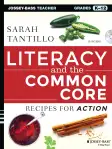 If you teach in a state that uses PARCC assessments, then you have probably already reviewed the PARCC Practice Tests, so you know that the writing tasks look like this:
If you teach in a state that uses PARCC assessments, then you have probably already reviewed the PARCC Practice Tests, so you know that the writing tasks look like this:
| 6th grade ELA:LITERARY ANALYSIS TASK:
Today, you will read and think about the passage from the novel titled Boy’s Life and the fable “Emancipation: A Life Fable.” As you read these texts, you will gather information and answer questions about comparing themes and topics so you can write an essay…. THEN: You have read the passage from Boy’s Life and “Emancipation: A Life Fable.” Both texts develop the theme of freedom. Write an essay that compares and contrasts the approaches each text uses to develop the theme of freedom. *** RESEARCH TASK: Today you will research how zoos impact animals. You will read one article titled “The Stripes Will Survive.” Then you will read one passage titled “The Zoos Go Wild” and view one video titled “Lions at the National Zoo.” As you review these sources, you will gather information and answer questions about how zoos impact animals so you can write an essay…. THEN: You have read two texts and viewed one video that claim that the role of zoos is to protect animals. Write an essay that compares and contrasts the evidence each source uses to support this claim. Be sure to use evidence from all three sources to support your response. *** NARRATIVE WRITING TASK: Today you will read a passage from a story titled Magic Elizabeth. As you read, pay close attention to the characters as you answer the questions to prepare to write a narrative story of your own…. THEN: In the passage from Magic Elizabeth, the author creates a vivid setting and two distinct characters, Mrs. Chipley and Sally. Think about the details the author uses to establish the setting and the characters. Write an original story about what happens when Sally arrives at Aunt Sarah’s house. In your story, be sure to use what you have learned about the setting and the characters as you tell what happens next.
|
In short, in the Literary Analysis and Research tasks, students analyze multiple texts and synthesize their findings in essay form. In the Narrative task, they read one piece of literature then, typically, continue the plot, incorporating elements from the original.
So: how can we prepare students to succeed at these tasks? And by “we,” I don’t mean only English teachers. Social studies and science teachers should take responsibility for the Research Writing Tasks.
- Train students to read the writing prompt(s) FIRST (i.e., before they read the passages or the questions) and show them how to annotate the passages effectively. Make sure students know how to annotate differently for different genres. Students need to practice using the online annotation tools, which are merely highlighters, at this point, though perhaps the technology will evolve. Until then, students should also take notes on a separate piece of paper while reading on-screen passages to simulate PARCC online testing conditions. PS—There is nothing on the PARCC Website to suggest that students cannot use blank scrap paper, and quite honestly, I don’t know how anyone could do well on these tasks without writing some notes.
- Model how to work through the writing task(s). Teach pre-writing organizational strategies. Students need to know that how you pre-write depends on the genre. Not everything requires a Venn diagram!
- Engage students in guided practice. When selecting passages for practice, consider “old” passages (which students have previously read and demonstrated comprehension of) in the early stages so that students can concentrate on their writing skills and so that you can see where their writing strengths and weaknesses appear. As you move into more independent practice, add “new” passages so that you can see how students handle the work when they have to decipher passages from scratch (especially texts of varying complexity). Keep moving toward “new” passages so that students will gain, ultimately, authentic practice in completing the assessment. Below are suggested progressions to illustrate this approach.
Gradual Release for Literary Analysis and Research Writing Tasks:
| Who Does? | Passage 1 | Passage 2 |
| I Do | OLD | OLD |
| We Do | OLD | OLD |
| You Do* | OLD | OLD |
| You Do | OLD | NEW |
| You Do | NEW | NEW |
Gradual Release for Narrative Writing Tasks:
| Who Does? | Passage 1 |
| I Do | OLD |
| We Do | OLD |
| You Do* | OLD |
| You Do | NEW |
| You Do | NEW |
*Depending on how things go, students might need additional “We Do” practice.
If you have any questions, comments, or thoughts about this post, please chime in!
Thanks,
ST

Pingback: PARCC Prep: Teaching Compare & Contrast | MiddleWeb
Pingback: Post #2: Where I am and Where I want to go – King's Inquiry Project